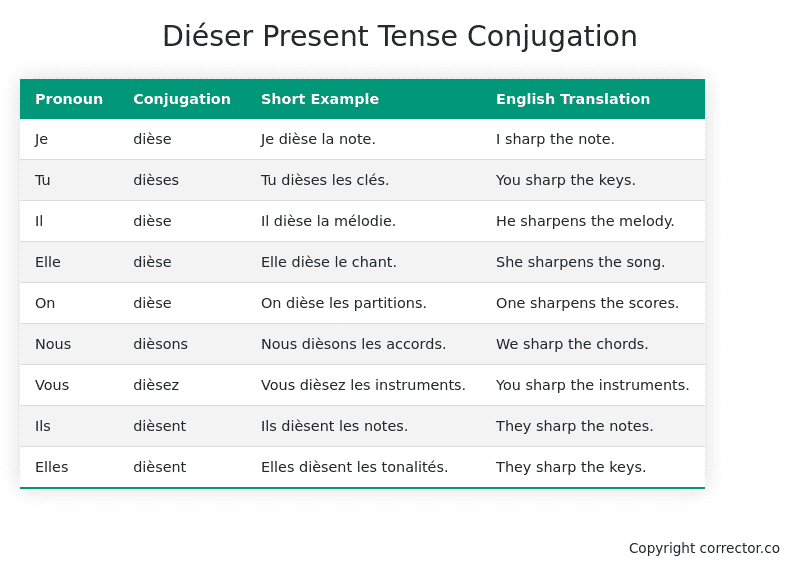Le Present (Present Tense) Conjugation of the French Verb diéser
Introduction to the verb diéser
The English translation of the French verb “diéser” is “to sharp” or “to raise by a semitone.” The infinitive form “diéser” is pronounced as dee-eh-zay.
The verb “diéser” originates from the Latin word “dis” meaning “apart” and “tonare” meaning “to thunder.” In everyday French, it is most often used in the context of music to indicate the action of raising a note by a semitone.
Here are three simple examples of its usage:
-
Je dois diéser cette note pour jouer la partition correctement.
(I have to sharp this note to play the score correctly.) -
Le professeur de musique nous a demandé de diéser la tonalité de cette chanson.
(The music teacher asked us to raise the key of this song by a semitone.) -
Si tu dièses cette note, le morceau sonnera plus brillamment.
(If you sharp this note, the piece will sound brighter.)
Note: The verb “diéser” is mainly used in musical contexts and may not be frequently used in everyday conversation.
Diéser – About the French Present Tense
To take a deep dive into all the French tenses then see our article on Mastering French Tense Conjugation.
Common Everyday Usage Patterns For Le Present
Interactions with Other Tenses
Table of the Present Tense Conjugation of diéser
| Pronoun | Conjugation | Short Example | English Translation |
|---|---|---|---|
| Je | dièse | Je dièse la note. | I sharp the note. |
| Tu | dièses | Tu dièses les clés. | You sharp the keys. |
| Il | dièse | Il dièse la mélodie. | He sharpens the melody. |
| Elle | dièse | Elle dièse le chant. | She sharpens the song. |
| On | dièse | On dièse les partitions. | One sharpens the scores. |
| Nous | dièsons | Nous dièsons les accords. | We sharp the chords. |
| Vous | dièsez | Vous dièsez les instruments. | You sharp the instruments. |
| Ils | dièsent | Ils dièsent les notes. | They sharp the notes. |
| Elles | dièsent | Elles dièsent les tonalités. | They sharp the keys. |
Other Conjugations for Diéser.
Le Present (Present Tense) Conjugation of the French Verb diéser (You’re reading it right now!)
Imparfait (Imperfect) Tense Conjugation of the French Verb diéser
Passé Simple (Simple Past) Tense Conjugation of the French Verb diéser
Passé Composé (Present Perfect) Tense Conjugation of the French Verb diéser
Futur Simple (Simple Future) Tense Conjugation of the French Verb diéser
Futur Proche (Near Future) Tense Conjugation of the French Verb diéser
Plus-que-parfait (Pluperfect) Tense Conjugation of the French Verb diéser
Passé Antérieur (Past Anterior) Tense Conjugation of the French Verb diéser
Futur Antérieur (Future Anterior) Tense Conjugation of the French Verb diéser
Subjonctif Présent (Subjunctive Present) Tense Conjugation of the French Verb diéser
Subjonctif Passé (Subjunctive Past) Tense Conjugation of the French Verb diéser
Subjonctif Imparfait (Subjunctive Imperfect) Tense Conjugation of the French Verb diéser
Subjonctif Plus-que-parfait (Subjunctive Pluperfect) Tense Conjugation of the French Verb diéser
Conditionnel Présent (Conditional Present) Tense Conjugation of the French Verb diéser
Conditionnel Passé (Conditional Past) Tense Conjugation of the French Verb diéser
Conditionnel Passé II (Conditional Past II) Tense Conjugation of the French Verb diéser
L’impératif Présent (Imperative Present) Tense Conjugation of the French Verb diéser
L’impératif Passé (Imperative Past) Tense Conjugation of the French Verb diéser
L’infinitif Présent (Infinitive Present) Tense Conjugation of the French Verb diéser
L’infinitif Passé (Infinitive Past) Tense Conjugation of the French Verb diéser
Le Participe Présent (Present Participle) Tense Conjugation of the French Verb diéser
Le Participe Passé (Past Participle) Tense Conjugation of the French Verb diéser
Struggling with French verbs or the language in general? Why not use our free French Grammar Checker – no registration required!
Get a FREE Download Study Sheet of this Conjugation 🔥
Simply right click the image below, click “save image” and get your free reference for the diéser present tense conjugation!

I hope you enjoyed this article on the verb diéser. Still in a learning mood? Check out another TOTALLY random French verb present conjugation!


